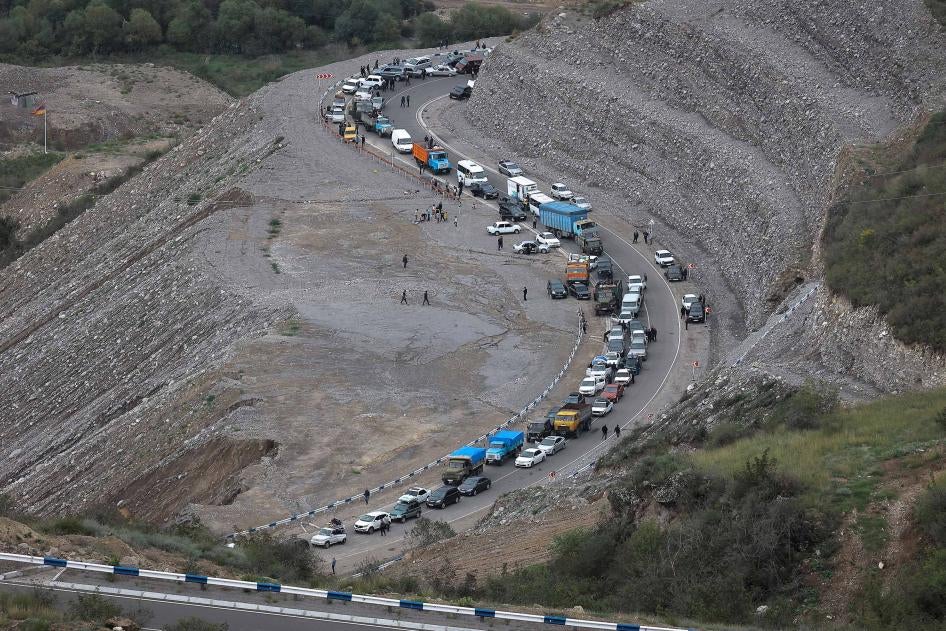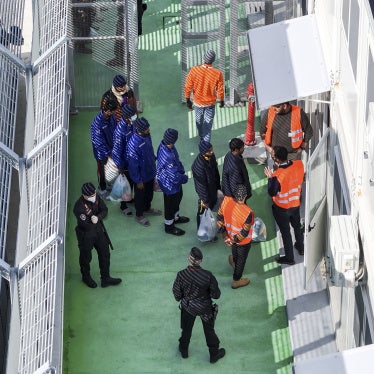(Berlin, October 5, 2023) – Governments involved in facilitating talks between Azerbaijan and Armenia should secure concrete commitments from Azerbaijan’s president on respecting, protecting, and implementing the right to return of ethnic Armenians from Nagorno-Karabakh, Human Rights Watch said today. More than 100,000 ethnic Armenians, nearly the entire current population of the area, have fled in recent days.
Azerbaijan’s plan for reintegration of the region and its residents should set out how, in both the short and long-term, it will respect human rights, in particular those of ethnic minorities; and it should welcome an independent mission for sustained international monitoring of these commitments.
Azerbaijan’s partners should insist on an international monitoring mission to report publicly on conditions facing ethnic Armenians who have remained in Nagorno-Karabakh, and to identify human rights violations, particularly those that would undermine ethnic Armenians’ right to return to their homes. Partner governments should also urge Azerbaijani authorities to take substantive steps to facilitate the right to return, either for short-term visits or for the longer-term.
“Azerbaijan’s partners should send an unambiguous message to the country’s leadership that when it comes to the right to return, they will not accept hollow rhetoric and half measures,” said Hugh Williamson, Europe and Central Asia director at Human Rights Watch. “The fear and lack of trust on all sides make a sustained international presence essential for the right to return to be meaningful, not theoretical.”
Human Rights Watch interviewed, on the Armenian border, 14 individuals and 7 families who fled Nagorno-Karabakh; as well as 12 humanitarian workers, medical personnel, Armenian officials, and a representative of the former Nagorno-Karabakh de facto authorities.
The European Council President, Charles Michel, has facilitated a series of talks between Azerbaijani President Ilham Aliyev and Armenian Prime Minister Nikol Pashinyan. A meeting between the two leaders had been planned on the sidelines of the European Political Community (EPC) summit in Granada on October 5, 2023, with Michel’s participation together with French President Emmanuel Macron and German Chancellor Olaf Scholz. On October 4, Azerbaijani media announced that Aliyev had refused to participate in the talks at the last minute, against the backdrop of the French foreign minister’s October 3 visit to Armenia and other developments.
In possible future talks, European leaders should underscore the need for commitment to international rights monitoring and a comprehensive rights-compliant vision for the region that might encourage people to return. In an October 3 media interview, Michel urged Azerbaijan to “show goodwill by engaging, while respecting international law, to protect the rights and security of the entire population that lives in Azerbaijan, including the Armenian population.”
Germany’s foreign minister has publicly indicated that it, “along with its international partners,” is “committed to an international mission” to Nagorno-Karabakh, adding that the people of the region “need to be able to trust that they are not alone.”
More than 100,000 people have fled Nagorno-Karabakh to Armenia since September 24, leaving the region, in effect, temporarily depopulated. Among those who remain are older people and the very ill, who were either unwilling or unable to flee. The mass exodus followed Azerbaijan’s September 19 military attacks to regain full control over Nagorno-Karabakh. The next day, a cease fire was announced, followed by initial talks between Azerbaijani authorities and representatives of Nagorno-Karabakh’s Armenian community. The enclave’s de facto authorities then agreed to disband.
Nagorno-Karabakh is a region of Azerbaijan whose ethnic Armenian-majority population had, together with Republic of Armenian forces, fought a war to secede from Azerbaijan in the early 1990s. During this time, more than 700,000 ethnic Azeris were expelled or displaced from Armenia, Nagorno-Karabakh, and 7 surrounding districts; 300,000 to 500,000 ethnic Armenians fled or were expelled from Azerbaijan starting in 1988.
Nagorno-Karabakh remained de facto, separate from Azerbaijan, and occupied the seven surrounding districts until 2020, when Azerbaijan initiated hostilities and retook most of the area. A truce statement ending the 44-day war provided for Russian peacekeeping troops to have a presence in Nagorno-Karabakh and to control what was then the Lachin Corridor, the only road linking Nagorno-Karabakh to Armenia, until 2025.
Azerbaijan blocked the Lachin Corridor from December 12, 2022, through September 24, 2023, causing a near complete disruption of the movement of people and goods. It resulted in acute shortages of food, medications, hygiene products, petrol, and other essential supplies in Nagorno-Karabakh. Azerbaijan also eventually cut utility lines from Armenia to Nagorno-Karabakh.
When the Lachin road reopened on September 24, people began to flee. People interviewed said they fled their homes in fear and panic. Many also said that the nine-month de facto blockade and alleged atrocities by Azerbaijani forces during the 2020 war, including the killings and torture of civilians, caused extensive fear and distrust.
People interviewed described an ordeal lasting days on the clogged Lachin road with little or no food or water, jammed in their cars, trucks, and other vehicles with their families and whatever few belongings they could quickly take.
“We could not even take any possessions except documents and a change of clothes, no space in the car,” said a woman from Kert village.
A woman who travelled with nine people crowded into a car said: “We went to Khodjaly and spent four days at the peacekeepers’ base, at the airport just sitting on the asphalt, waiting for evacuation.”
An official in Goris, Armenia, said that a number of people, mostly older, had died during the mass exodus, although Human Rights Watch did not independently verify this.
Azerbaijani authorities have repeatedly said that everyone’s rights will be protected in Nagorno-Karabakh, yet such assertions are difficult to accept at face value after the months of severe hardships, decades of conflict, impunity for alleged crimes, in particular during hostilities, and the Azerbaijani government’s overall deteriorating human rights record, Human Rights Watch said.
Most people interviewed said they would consider returning to Nagorno-Karabakh to collect their belongings if they could do so under international protection. A man from Khankendi (Stepanakert) said he would consider returning with his family for the longer term “if Azerbaijan allows Armenians to live there as a community – with Armenian schools, Armenian church, administration staff recruited from members of the community.”
With Aliyev’s withdrawal from the Granada talks, the EU, US, and others involved in mediating negotiations should redouble efforts to emphasize specific steps Azerbaijan needs to take to facilitate the right to return, whether for short-term visits to collect remaining belongings, deal with their real estate property, visit graves, and the like, or for those who wish to return permanently, Human Rights Watch said.
Those who choose not to return permanently should be compensated for their property and should be able to collect any other goods left behind as well as access any bank accounts or benefits, such as pensions. Azerbaijan should also ensure that evacuees’ property is protected from looting or other harm.
For those who return, Azerbaijan should ensure access to education in the Armenian language and provide concrete guarantees protecting people’s ability to exercise civil, political, religious, and cultural rights without discrimination. Ethnic Armenians who fled should be provided with all necessary information and clear guidelines on resuming their residency in Nagorno-Karabakh, and how their rights, including to property and social security entitlements, will be assured. Future arrangements should provide for an ethnic balance in policing and local governance structures. In line with international humanitarian law, Azerbaijan should refrain from prosecuting people for participating in military hostilities during the wars of the 1990s and in 2020.
“The past few weeks have been a horrific period for Nagorno-Karabakh’s ethnic Armenian population”, Williamson said. “Azerbaijan’s partners should now ensure that Azerbaijani authorities do not turn this trauma and loss into long-term injustice.”








